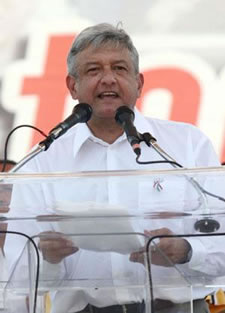 |
 |
 |
 Editorials | Opinions | July 2006 Editorials | Opinions | July 2006  
Not 'For The Good Of All'
 Washington Times Washington Times


| | "For the good of all, for the poor first" goes Lopez Obrador's party slogan. |
The possibility becomes probability that Andres Manuel Lopez Obrador, the truculent leftist, will defeat Felipe Calderon, the free-market conservative, in Mexico's presidential election, and this is not particularly good news for the United States. Public-opinion polls, which are not particularly reliable, show the two candidates neck-and-neck heading into the July 2 election, erasing a brief Calderon surge.

"For the good of all, for the poor first" goes Mr. Lopez Obrador's party slogan. To understand what this means in practical terms merely requires a look at Mr. Lopez Obrador's tenure as mayor of Mexico City. His populist initiatives included free medical services, public transportation and a $70 monthly handout to the elderly. He also launched expansive road construction that failed to improve traffic conditions but did manage to increase Mexico City's debt. Debt was not the only thing on the rise during Mr. Lopez Obrador's years as mayor - unemployment and crime also increased.

Comparisons have frequently been drawn - rightly, in many respects - between Mr. Lopez Obrador and the other resurgent authoritarian leftists in Latin America like Bolivian President Evo Morales, who marked his first 100 days in office with widespread nationalization of Bolivia's energy industry. But Mr. Lopez Obrador, unlike Mr. Morales, is not likely to place expropriating foreign assets or nationalizing industry high on his agenda. This point does little, however, to allay other serious concerns for Mexico's economic outlook under a Lopez Obrador presidency. Mr. Lopez Obrador has pledged to renegotiate NAFTA, changing Mexico's course away from economic integration. To satisfy his base, composed of the poorest in Mexico, Mr. Lopez Obrador would look to further subsidies - financed by the redistribution of wealth and an increase to the national debt - as he did in Mexico City.

Mr. Lopez Obrador would make Vicente Fox seem cooperative on the crucial immigration issue. Both candidates have been sharply critical of U.S. border enforcement; both are eager to export Mexicans to the United States. Mr. Lopez Obrador said in a debate with Mr. Calderon that he would expand consulates in the United States to provide Mexican immigrants with legal services. Improving the Mexican economy would ease immigration pressure, but the leftist candidate appears committed to an agenda that would produce only economic stagnation.

Democracy in Mexico is still relatively young, and it's not clear how effectively its institutions - an independent judiciary and a separation of powers, for instance - can withstand the rule of an authoritarian who has a proven contempt for both. The authoritarian populist would have to build a coalition in the politically divided legislature, which may have a moderating effect on his policies - or may encourage him to consolidate his power and attempt to marginalize the legislature in order to force through his agenda. | 
 | |
 |



